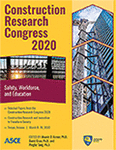Construction Research Congress 2020
Standardized Test Scores as an Indicator of Success for Problem-Based Learning
Publication: Construction Research Congress 2020: Safety, Workforce, and Education
ABSTRACT
Since the 1920s, standardized testing scores such as the Scholastic Aptitude Test (SAT), followed by the American College Testing (ACT) Program in the 1950s, have been used in the college admissions process as an indicator of potential academic success. While only one of the factors considered in the admissions process, the scores are believed to be a way to compare applicants from different high schools and backgrounds. Standardized testing scores are typically used to indicate potential academic success in traditional lecture-based courses based on evidence of a direct correlation between high standardized test scores and future academic success. The construction management curriculum at Mississippi State University follows a problem-based pedagogy, which is a more active form of learning that engages a different thought process than the more passive lecture-based learning. Using ten years of admissions and academic data collected from 144 students who have completed the core studio sequence, this paper seeks to determine whether there is a correlation between standardized testing scores and academic success in problem-based learning. Preliminary results indicate there is a weak direct correlation between standardized testing scores and academic success and only to a certain point. The results of this study can be useful in recruiting and identifying at-risk students.
Get full access to this article
View all available purchase options and get full access to this chapter.
REFERENCES
Burton, N.W., and Ramist, L. (2001). “Predicting success in college: SAT studies of classes graduating since 1980.” 2001-2, The College Board, New York.
Ellrich, L. M. (2014). “Are SAT scores a strong predictor of student success? A study of education majors, admission variables and the impact of leadership development.” Theses & dissertations, Paper 28,<https://digitalcommons.usm.maine.edu/cgi/viewcontent.cgi?referer=&httpsredir=1article=1051&context=etd> (July 17, 2019).
Evans, B. (2015). “College admission testing in America.” International Perspectives in Higher Education Admission Policy: A reader, In Stead, V., ed., Peter Lang Publishing, New York.
Monson, C. and Hauck, A. (2012). “A comparison of two inquiry-based construction management curricula.” Proc., 48thASC Annual International Conference, Birmingham City University, Birmingham, UK.
Noble, J. and Sawyer, R. (2002). “Predicting different levels of academic success in college using high school GPA and ACT composite score.” 2002-4, ACT, Iowa.
Norman, G. and Schmidt, H. (1992). “The psychological basis of problem-based learning: a review of the evidence.” Academic Medicine, 67(9), 557-565.
Soares, J.A. (2012). SAT wars: the case for test-optional college admissions. Teachers College Press, New York.
Stewart, D. M., & Johanek, M. C. (1996). “The evolution of college entrance examinations.” University of Pennsylvania Scholarly Commons, <http://repository.upenn.edu/gse_pubs/179> (July 17, 2019).
Wao, J.O. et al., (2017). “SAT and ACT scores as predictors of undergraduate GPA scores of construction science and management students.” Proc., 53rdASC International Conference, Univ. of Washington and Washington St., Seattle, WA, 83-90.
Information & Authors
Information
Published In
Construction Research Congress 2020: Safety, Workforce, and Education
Pages: 726 - 732
Editors: Mounir El Asmar, Ph.D., Arizona State University, David Grau, Ph.D., Arizona State University, and Pingbo Tang, Ph.D., Arizona State University
ISBN (Online): 978-0-7844-8287-2
Copyright
© 2020 American Society of Civil Engineers.
History
Published online: Nov 9, 2020
Authors
Metrics & Citations
Metrics
Citations
Download citation
If you have the appropriate software installed, you can download article citation data to the citation manager of your choice. Simply select your manager software from the list below and click Download.
